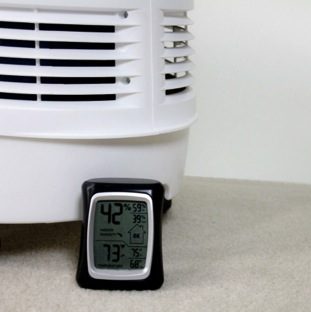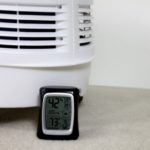Air that’s too dry can contribute to respiratory problems and can also damage wooden structures and expensive musical instruments in your home. Combating the problem with room humidifiers is costly, time-consuming, and ineffective when compared to the convenience and value provided by a whole-house humidifier. An upfront investment in a whole-home humidifier can provide you years of comfort and health benefits.
What Is a Whole-House Humidifier
Whole-home humidifiers are components of a heating and cooling system that add more moisture to air as it circulates throughout the building. Whole-home humidifiers are installed between the HVAC system’s supply and return air ducts. Humidity levels are controlled by a device that acts much in the same way that your thermostat does, allowing you to set a desired humidity level in your home. Whole-home humidifier types include bypass, fan-powered, and steam devices.

- Bypass humidifiers use the blower motor of your HVAC system’s furnace to push air through your unit. For this humidifier to work, the furnace must be running. These devices require extra ductwork in your HVAC system.
- Fan-powered humidifiers have their own fan and operate independently of the furnace. A fan-powered humidifier can humidify a home faster than a bypass humidifier.
- Steam humidifiers also work independently of the HVAC system. The device generates steam by energizing electrodes that reach a water reservoir in the device, causing the water to boil and generate steam. Steam generated by the device is then distributed throughout the home via the HVAC unit’s air ducts.
- Portable humidifiers are smaller devices that work to add moisture to the rooms where they are located. Portable humidifier types include vaporizers, evaporative, and ultrasonic devices, each using a different method to add moisture to the air. While portable humidifiers are initially cheaper than whole-home humidifiers, they are less effective and, over time, the hassle and costs of operating them add up substantially.
What Are the Benefits of Whole-House Humidifiers?
Whole-home humidifiers offer a number of benefits to their owners, including:
- Comfort – Houses with excessively dry air can be very uncomfortable, as dry air can make your skin itch or break out. Air with the right level of humidity just feels a lot better than dry air and, as soon as you install a whole-home humidifier, you’ll be able to tell an immediate difference in the comfort of your home.
- Convenience – Operating individual room humidifiers can be a big hassle, as you have to refill most devices with water and wait for the device to adequately humidify the room or rooms you’re dealing with. A whole-home humidifier is a “set it and forget it” device that requires minimal effort on your behalf. All you have to do is select the humidity setting on the device’s hygrometer and let the whole-home humidifier do the rest. It’s that easy.
- Health – Air that’s too dry can contribute to increased allergy and respiratory problems. Installing a whole-home humidifier can greatly improve your respiratory health and the health of your children or other loved ones residing in your home.
- Minimal maintenance – One of the truly great things about whole-home humidifiers is that they require very little upkeep. They work almost invisibly in your home, and all you need to do is set a humidity level from the controller. These devices are incredibly reliable and only rarely do they require the attention of an HVAC specialist. Once a qualified technician performs whole-house humidifier installation, you’ll rarely have to be concerned about the device.
- Cost – Whole-home humidifiers are far less expensive to operate than individual room humidifiers. A room humidifier requires distilled water to operate at optimal efficiency. The cost of distilled water, not to mention the travel expense and hassle it takes to purchase it regularly, adds up after a while.
Whole-home humidifiers are connected to your home’s plumbing system, meaning that you’ll never have to run to the store to purchase distilled water for the device. Experts estimate that a whole-home humidifier only adds a few cents to your monthly water bill. In terms of cost and convenience, the choice between whole-house humidifiers and room humidifiers is clear.
Impact of Dry Air
While dry air is commonly associated with dusty, desert states like Arizona, even Virginia can experience dry air, particularly during the winter months. Humidity levels in Virginia can drop during the winter months, as cold air cannot hold as much moisture as warmer air. The ideal humidity level for your home is around 45 percent but, in the winter months, it can cause it to drop to around 15 percent.
Excessively dry air in your home can cause problems such as:
- Weakening of your respiratory system’s ability to filter – Your nose and throat are lined with moist membranes that catch dirt, dust, bacteria, and other contaminants. When these membranes are too dry, they lose their effectiveness, making it more likely that you will get sick.
- Nasal irritation – Dry air can irritate your nose, causing it to become itchy and uncomfortable. If your nose gets excessively dry, nosebleeds can occur.
- Joint and muscle pain – Dry air can contribute to dehydration and, when our bodies become dehydrated, it can result in less lubrication for the moving parts of our bodies, such as joints and muscles. This can cause significant discomfort and pain.
- Skin problems – When the air lacks humidity, your skin will start to dry. Our skin is almost 50 percent water and, when dry air begins sucking the moisture out of it, severe discomfort is bound to follow. Itching and flaking can occur, and problems such as eczema, psoriasis, and acne can be exacerbated.
- Static electricity build-up – Humid air causes static electricity to dissipate quickly, but dry conditions result in a build-up. If you’re frequently getting shocked when touching your doorknob or other metal surfaces, dry air could be a culprit.
- Wooden structure damage – When the air is dry, it will try to pull moisture from wherever it can, including the wooden structures of your home. Wood contains a certain amount of moisture and, when that moisture is drawn from the wood, wooden structures can warp or shift. This can make your doors hard to open and close or cause gaps between your ceiling and walls. Dry air can also cause damage to wooden furniture, as well as musical instruments made of wood, such as violins, pianos, and guitars.
Be sure not to go overboard when humidifying your home, as excess humidity can contribute to health and other problems, too. For example, too much humidity in your home can create an environment where mold can thrive. Mold can cause severe health threats for major respiratory disease, and some studies have even linked it to cancer. Mold is a huge red flag for property buyers, and houses with mold may have to undergo expensive remediation before they are able to sell.
Heating and cooling experts recommend a humidity level of between 40 and 50 percent to provide comfort while preventing microorganism growth. Whole-home humidifiers can help homeowners maintain this optimal humidity level.
A-Advantage is the first name in heating and cooling with locations in Alexandria and Manassas; serving Northern Virginia, Southern Maryland and the District of Columbia. Founded in 1990, A-Advantage is a family-owned business that has built a reputation for outstanding service and fair dealing. The company provides installation, maintenance, and repair services and carries a wide range of products, including geothermal systems and whole house humidifiers.
A-Advantage earned the “National Medal of Excellence” award from HVAC manufacturer Bryant, thanks to its customer retention efforts. Contact A-Advantage today for a consultation to find out how a whole-home humidifier or other advanced HVAC product can improve your life.
Sources
1. https://www.hvac.com/blog/home-ventilation-whole-house-humidifiers-vs-portable-humidifiers/
2. https://www.livestrong.com/article/197018-how-to-use-a-humidifier-in-a-babys-room/
3. https://health.clevelandclinic.org/2016/02/can-best-combat-effects-dry-winter-air/

